
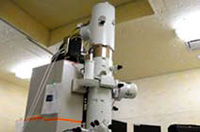
The Cooperative Research Center is a one-stop service which functions as a general support window for industry-academia collaboration, both within and outside the university. The center’s mission is to help turn the university’s outstanding research achievements into practical applications, to create innovation and to ensure that society benefits from these achievements.
The center consists of the Division of Cooperative Research and the Division of Intellectual Property, with both divisions working in unison to promote activities conducted in collaboration with society, from the discovery and actualization of seeds for research to collaborative and consigned research with industry and the technological transfer of research achievements.
So as to ensure that these activities run smoothly, the center performs a range of functions relating to industry-academia collaboration activities, such as by holding science and technology consultations and technological seminars, facilitating matching between research and local needs, and protecting intellectual property rights.
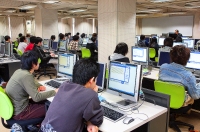
The General Information Processing Center administers 387 network boot-type thin client terminals, high-speed servers for large-scale calculations and campus network systems. Anyone from the university is able to use the center for education and research purposes, from teaching staff to graduate and undergraduate students. In order to respond to increasingly sophisticated and diverse demands for information-related education, the center conducts education, research and various tasks, and provides support to the wider region.
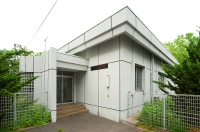
If treated correctly, radioisotopes are extremely powerful tools in helping shed light on such things as the mechanisms behind chemical reactions. The Radioisotope Research Center is run with the aim of providing support for research and education which utilizes radioisotopes, as well as putting in place safety management related to the handling of radioactive materials. The center consists of a chemical laboratory, -10°C and 4°C low temperature laboratories, a radioactivity measurement room, a precision instrument measurement room, neutron irradiation room, and an RI repository, thus providing an optimal research environment.
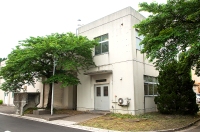
In order to contribute to environmental conservation by processing waste liquids containing harmful substances that are generated in the course of education, research and medical care, the Environmental Research Center separates hazardous waste into inorganic liquid waste, organic liquid waste and harmful solid waste and conducts the correct treatment and disposal of these through source-separated collection. As waste liquids which possess a diverse range of characteristics are unique to research facilities, the center seeks to examine and improve on processing technologies and to ensure that all materials are processed in a correct manner. In addition, the center also engages in education, practical training and joint research connected with the environmental sciences, both within and outside the university.
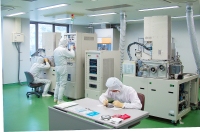
In the IT and nanotechnology industries, rare elements with advanced functionality are vital materials, driving fears over an eventual drain of resources. Since the completion of the research building in May 2001, one of the Venture Business Laboratory’s major projects has been “the development of new recycling technologies focusing on rare element substances and research on the design of advanced materials.” To this end, we are involved in interdisciplinary education and research incorporating the training of creative graduate students and young researchers who possess a venture mindset, with the aim being to create new forms of industry.
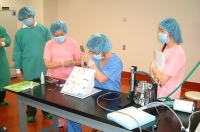
The Bioscience Education and Research Center was formed in 2004 academic year with the merger of the former Animal Facilities for Experimental Medicine, Central Research Laboratory and RI Center into a single efficient joint education and research facility that is available for use not only to members of the university but also to researchers from regional research and medical facilities and corporations.
In addition to providing services including the latest analytical devices for life science research, bio-related experimental services, appropriate management of laboratory animals, and a laboratory environment utilizing radioisotopes, the center is also involved in a diverse range of other research activities, such as the screening of bioscience research conducted within the university, development and applied research of welfare and medical technologies, and research on the creation and development of new laboratory animals.
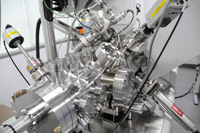
The Akita University Venture Incubation Center was established with the aim of incubating industrial revitalization and human resource training based on the development of joint research within Akita University. The laboratories at this center are available for use by teaching staff to conduct joint research with the corporate world, not only those from Akita University but also those belonging to other education and research institutes located within the prefecture.
Furthermore, in addition to acting as a center for research on resources, the environment and recycling, Akita Center for Joint Research between Industry, Government and Academia was established within AU-VIC with the goal of becoming a comprehensive hub for collaboration between industry, government and academia within Akita Prefecture. With state of the art research facilities, this center is available for limited open use as a hub for collaboration between industry, government and academia.
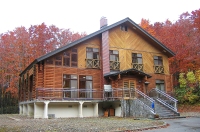
Nyuto Lodge was established in November 1996 as a study and extra-curricular activity facility for students and as a training and welfare facility for teaching staff. The lodge is located in a corner of Nyuto Hot Spring Village (selected as one of the best one hundred secluded hot springs in Japan), in the south of Towada-Hachimantai National Park. The surrounding area is blessed with a rich natural environment and resources, including Mt. Akita-Komagatake, said to be a treasure house of alpine plants, Lake Tazawa, the deepest lake in Japan, Nyuto Campsite and Lake Tazawa Ski Resort, making it possible to carry out a range of activities throughout the year.